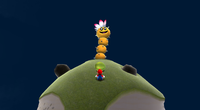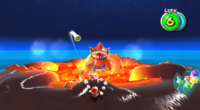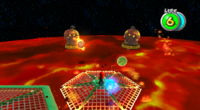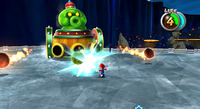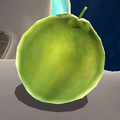Coconut
| Coconut | |
|---|---|
 Model of a coconut from Super Mario Galaxy | |
| First appearance | Donkey Kong 3 (1983) |
| Latest appearance | Paper Mario: The Thousand-Year Door (Nintendo Switch) (2024) |
- “Ah...HA! A Coconut, is it not? Well, that IS island fare, but somewhat cliched...”
- —Flavio, Paper Mario: The Thousand-Year Door
Coconuts appear in the Super Mario franchise as fruit most commonly used as projectiles by the player characters or enemies.
History[edit]
Donkey Kong 3 / Donkey Kong 3: Dai Gyakushū[edit]
Coconuts in Donkey Kong 3 are indestructible projectiles sometimes thrown by Donkey Kong. In the arcade version, he throws them in every stage, while in home console releases, he does so in the yellow greenhouse only. Coconuts also appear in Donkey Kong 3: Dai Gyakushū. The back of the North American Donkey Kong 3 NES cover mistakenly misspells coconuts as "cocnuts".
Donkey Kong Country[edit]
Coconuts in Donkey Kong Country are small projectiles shot by Neckys and Mini-Neckys and large projectiles shot by Master Necky and Master Necky Snr., all as a method of attacking.
Club Nintendo[edit]
A coconut in the Club Nintendo comic "Banana Day 24" is a fruit adored by alien species. The giant aliens mistook Earth for being a giant coconut when pulling it away, and they agree to return the planet back to its original position as Diddy Kong starts to give them bananas in return.
Mario Kart 64[edit]
Coconuts[1] (referred to as stones in the instruction manual), which appear to actually be horned melons, in Mario Kart 64 are thrown at racers in D.K.'s Jungle Parkway who drive off course, slowing them down while hitting them back toward the main track. However, coconuts do not affect racers who are using Super Stars. In the track's reappearance in Mario Kart Wii, no coconuts are thrown.
Donkey Kong 64[edit]
Coconuts in Donkey Kong 64 are shot from Donkey Kong's Coconut Shooter. Coconuts also have a fictional counterpart, Crystal Coconuts, a consumable source of power for the Kongs' special abilities.
Donkey Kong Country television series[edit]
In the Donkey Kong Country television series, the Crystal Coconut reappears, except it has healing and fortune-telling properties.
Paper Mario series[edit]
| Coconut | |
|---|---|
| Paper Mario description | A coconut from Lavalava Island. Throw it to damage 1 enemy. |
| The Thousand-Year Door description | Fruit from a tropical island. To be honest, it ain't tasty. |
Paper Mario[edit]
Coconuts in Paper Mario are found only in certain Coconut Trees. Such trees can be found near the shores of Lavalava Island as well as in Yoshi's Village, though some of the trees drop other items. To get them from the trees, Mario can simply whack them with his current Hammer. In battle, it is used as a weapon; it can be thrown at a single enemy to deal 3 HP damage. Coconuts are used in many recipes. Mario can sell them at any shop for 1 coin. Coconuts are also mentioned in the Tattle for Stone Chomps.
Paper Mario: The Thousand-Year Door[edit]
Coconuts in Paper Mario: The Thousand-Year Door are found only on one Coconut Tree, on a small island behind the bridge scene in Keelhaul Key. Unlike in Paper Mario, it can be eaten by Mario or his partner to recover 5 HP. They are once again used in many recipes. They can be sold to shops for a varying price from 1 coin to 4 coins. Mario must give one to Flavio on Keelhaul Key to obtain a Chuckola Cola, which must be given to Admiral Bobbery in order to revive him.
Paper Mario: Color Splash[edit]
In Paper Mario: Color Splash, papercraft coconuts[2] appear hanging from the palm trees on Bloo Bay Beach. When Mario hammers a tree, it drops a coconut, which cracks open to reveal a coin.
Mario Party 3 / Mario Party Superstars[edit]
Coconuts in Mario Party 3 and Mario Party Superstars appear in the 1-vs-3 minigame Coconut Conk, where the team of three must Ground Pound coconut trees to cause coconuts to drop from them and land on the player in the barrel.
Super Mario series[edit]
Super Mario Sunshine[edit]
Coconuts in Super Mario Sunshine are one of the fruits located in Delfino Plaza, and sometimes have to be used for a Yoshi to hatch out of its egg. If Yoshi eats one, he turns pink and refills his juice tank, allowing him to turn enemies into pink ascending platforms. They can also be thrown by Mario. There are also tasks in the game in which if the player puts enough of them in a basket (or other fruits), they are rewarded with a blue coin or 1-Up Mushroom.
Super Mario Galaxy[edit]
Coconuts in Super Mario Galaxy are objects that Mario can spin into to send them flying, proving useful for defeating enemies such as Pokeynuts and prickly plants, as well as projectiles used by King Kaliente and Roctos. When 9999 Star Bits are collected, all coconuts become watermelons.
Super Mario Galaxy 2[edit]
Coconuts in Super Mario Galaxy 2 are objects are used to defeat Roctos, Prince Pikante, open chests, and so forth, similarly to Super Mario Galaxy. All coconuts become watermelons after 9999 Star Bits are collected.
The Super Mario Bros. Movie[edit]
A coconut with a straw in The Super Mario Bros. Movie is seen in Cranky Kong's hand while he watches Mario and Donkey Kong fight in the Great Ring of Kong.
Paper Mario recipes[edit]
Paper Mario[edit]
| Recipe | Result |
|---|---|
Paper Mario: The Thousand-Year Door[edit]
| Recipe | Result |
|---|---|
Gallery[edit]
A coconut from Donkey Kong 64
Names in other languages[edit]
| Language | Name | Meaning | Notes |
|---|---|---|---|
| Japanese | ヤシの Yashi no Mi |
Coconut | |
| Chinese | 椰子[?] Yēzi |
Coconut | |
| Dutch | Kokosnoot[?] | Coconut | |
| French | Cocotier[?] | Coconut | |
| German | Kokosnuss[?] | Coconut | |
| Italian | Noce di cocco[4] | Coconut | |
| Cocco[?] | |||
| Korean | 코코넛[?] Kokoneot |
Coconut | |
| Portuguese | Coco[?] | Coconut | |
| Spanish | Coco[?] | Coconut |
References[edit]
- ^ Owsen, Dan, Scott Pelland, Paul Shinoda (1997). Mario Kart 64 Player's Guide. Nintendo of America (American English). Page 66–67, 69.
- ^ Paper Mario: Color Splash internal data: \content\Graphics\DisposObject\MOBJ\MOBJ_B_Coconut.bfres.lz
- ^ "Paper Mario: The Thousand-Year Door From Japanese to English". (June 1, 2014). The Mushroom Kingdom. Retrieved February 2, 2015.
- ^ "Mi servono... noci di cocco! Portamene 3 per favore." – Female Pianta. Super Mario Sunshine (Italian).
| Donkey Kong 3 | ||
|---|---|---|
| Characters | Donkey Kong • Stanley | |
| Enemies | Buzzbee • Creepy • Super Bee* • Vine Eater* • Beespy • Attacker • Kabutomushi • Butterfly | |
| Items and objects | Beehive • Flower • Sprayer • Super Sprayer | |
| Greenhouses | Blue • Gray • Yellow | |
| Other | Gallery • Staff | |
